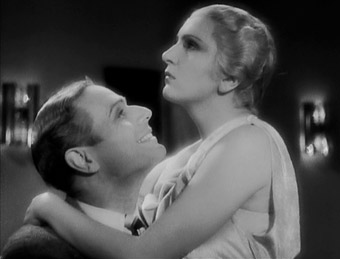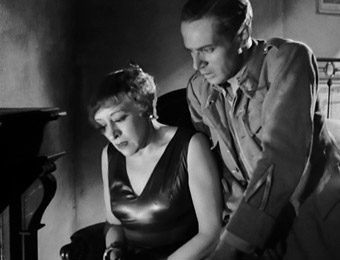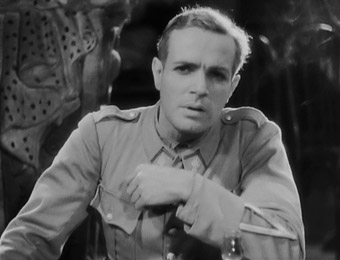|
It's rare to find a film that is thought provoking without being challenging and comfortable without being banal. Le Grand Jeu is both; a delightful story of emotional cascades that considers the way we relate to other people. Jaques Fedyer directs Pierre Richard-Willm as a disgraced Parisian playboy who joins the French Foreign Legion to flee public shame. He leaves behind flightily socialite Florence (Marie Bell), who makes empty promises about following the destitute Pierre.

This prologue is the mould that shapes the rest of the film, turning Pierre into a misanthrope who wiles away his enforced 5-year service pining for his lost love. He cuts a morose figure among cavorting Legionnaires in a small Moroccan town. It's here we get our first glimpse of Richard-Willm's masterstroke – creating a likeable character whose major plot points are objectionable. In the quieter sections of the film, Pierre's weedy moping inspires sympathy, but it's not long before you're reminded of his flaws: his enforced exile is thanks to amoral embezzling, he is a drunk who habitually runs from his problems, and he consistently mistreats the women in his life. Georges Pitoëff's upbeat Legionnaire doesn't arrive with the same depth as the rest of the cast, but he is an excellent example of how unlikely it is that the simpatico Pierre will repay tokens of friendship. Richard-Willm takes the solid screenplay and creates a stimulating anti-hero that never compromises the easy flow of the narrative.
Despite being consistently excellent, Willm frequently cowers in the radiant light of Marie Bell. She plays two characters, the seductive Florence and a bar entertainer turned prostitute with an uncanny resemblance to his former belle. The second character, Irma, is dubbed by Claude Marcy, a device that works surprisingly well. Already addled by loneliness, the arrival of Irma deeply shocks Pierre. He becomes increasingly confused about whether or not this mysterious girl is the woman he loved or a coincidental doppelgänger. Irma begins as a shy and naive creature, who hints at memory loss and suspiciously clings to Pierre. The confused soldier initially declines her fumbling advances, but cannot resist the phantom of Florence. Marie Bell's switch from confidence to innocence is extremely convincing. Within the first few minutes of Irma's appearance, her whole demeanour marks her as a different character, rather than just an alternative voice. More studied and impressive is Irma's slow progression from youthful doubt to a more settled character, buoyed by the love and attention of Pierre. The relationship between the two leads is comfortable, giving them a solid platform from which to fully express themselves. Bell's ability to convey complex emotions with a simple twitching facial expression adds a giddy spark to many of her scenes.

Of the supporting cast, Françoise Rosay is given the most screen-time as the owner of the hotel in which Pierre and Irma live. She is a very steady hand at the wheel and provides a dependably solid avenue for the two main characters to express themselves. Unfortunately, her use of tarot cards to predict Pierre's future adds an unwelcome slice of pseudo-mysticism into what is otherwise a very believable narrative. There is, at least, a decent pay-off that makes it mostly worthwhile. Any element of the unreal stands out thanks to the natural feel of the story. ‘Natural' is very much the byword for Le Grand Jeu and the key reason why it so easy to engage with. The actors and the screenplay collude to create interesting people, who aren't exaggerated single aspects of a personality or ready-made clichés. We can easily relate to their human behaviour and emotions, without feeling like we've seen it all before. The story, too, mines familiar themes of love, loneliness, and fear, but within a narrative that is all its own. Even in the 76 years since its original release, the story of La Grand Jeu has not been excessively repeated. It is, however, a notable influence on Hitchcock's Vertigo (1958), which also used the conceit of two identical women.
It may well be that the picture's age masks the quality of the filmmaking. Actors burn as bright in any era, but the filmmakers of the early 1930's had a lot less technology and precedent than their modern-day descendants. Jacques Fedyer attempts nothing flashy or spectacular by today's standards, but he doesn't miss a beat. His well constructed angles are the perfect canvas on which the actors paint Le Grand Jeu's engaging narrative.
A solid 1.37:1 transfer sourced from Pathé's official restoration, the image is not always as crisp as some reconstructed works from this period, but otherwise the level of detail is very good and the image impressively cleaned up. The contrast is very well balanced – only occassionally do the lighter shades feel a little on the bright side. The odd spot of damage is still visible, but on the whole the image is remarkably clean. Given the film's age, this is a very nice job.

The Dolby 2.0 mono soundtrack has an inevitably restricted dynamic range but is otherwise in fine shape, having no background hiss or crackle and only the sort of minor distortion on louder sounds that's normal for a film of this vintage.
There are no extras on the disc, but Eureka have thrown in a 26-page booklet to accompany the film. Included are a series of essays and short extracts that delve into the film and its director in academic detail. The weightiest offering, both in terms of length and intellectual rigour, is an essay by Ginette Vincendeau – Professor in Film at Kings College, London. She spoils the story of Le Grand Jeu in the first paragraph, so make sure you avoid the booklet until after you've seen the film. She provides helpful background information on the picture's historical context, along with some brief academic musings.
More exciting are the three short essays by the film's director, Jaques Feyder. Two articles from 1926 consider the infancy of the cinematic medium and the difficulties of adapting literature to the screen. Neither are particularly relevant to Le Grand Jeu but they do show Feyder to be a filmmaker of excellent perception. Some of his comments are almost prophetic: "There are certain conventions that the public is familiar with already; these will multiply, come into alignment, and form a system which the director can play like a piano." A short missive from Feyder on Le Grand Jeu is followed by a few paragraphs from Charles Spaak (screenplay) and Charles Vanel (Clément) explaining why they are so fond of the director.
There's an easiness to Le Grand Jeu which might easily relegate it to the status of sleepy Sunday afternoon TV. But to create a film which is so interesting, while still maintaining that level of comfort, is an exceptional achievement. Two towering performances bear the weight of that quality, allowing the strong supporting cast and captivating narrative to blossom. Le Grand Jeu is a gem of early poetic realism that is fully deserving of this new DVD release.
|